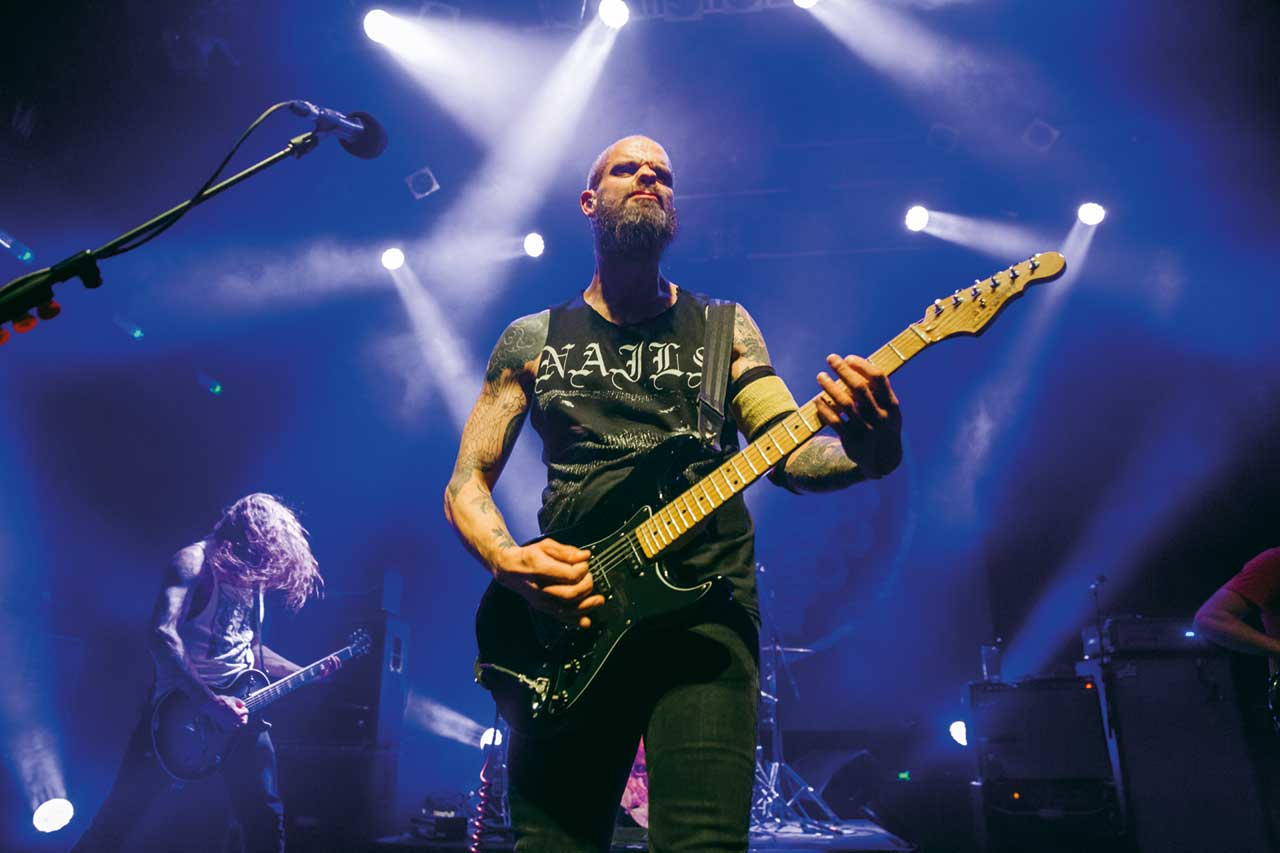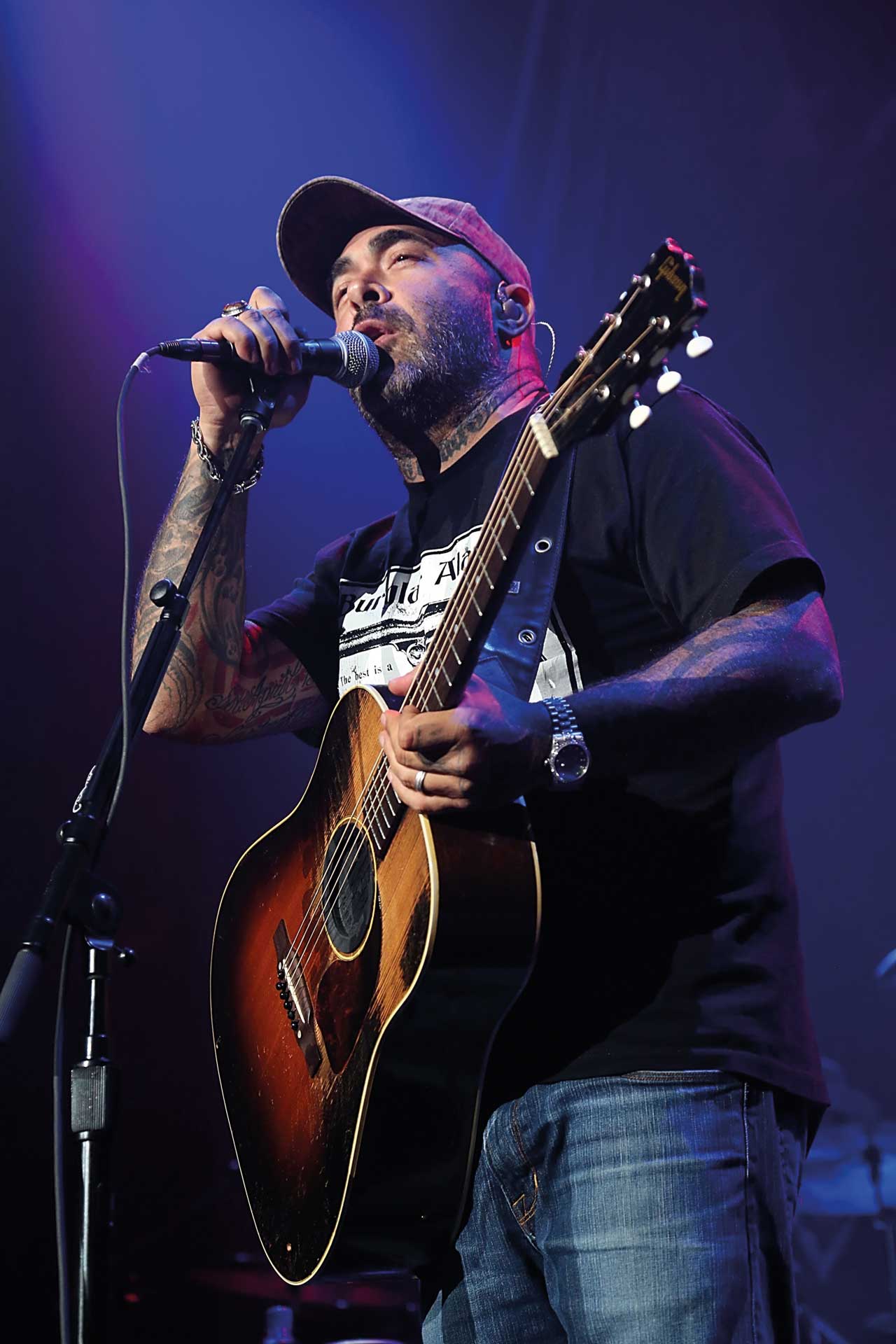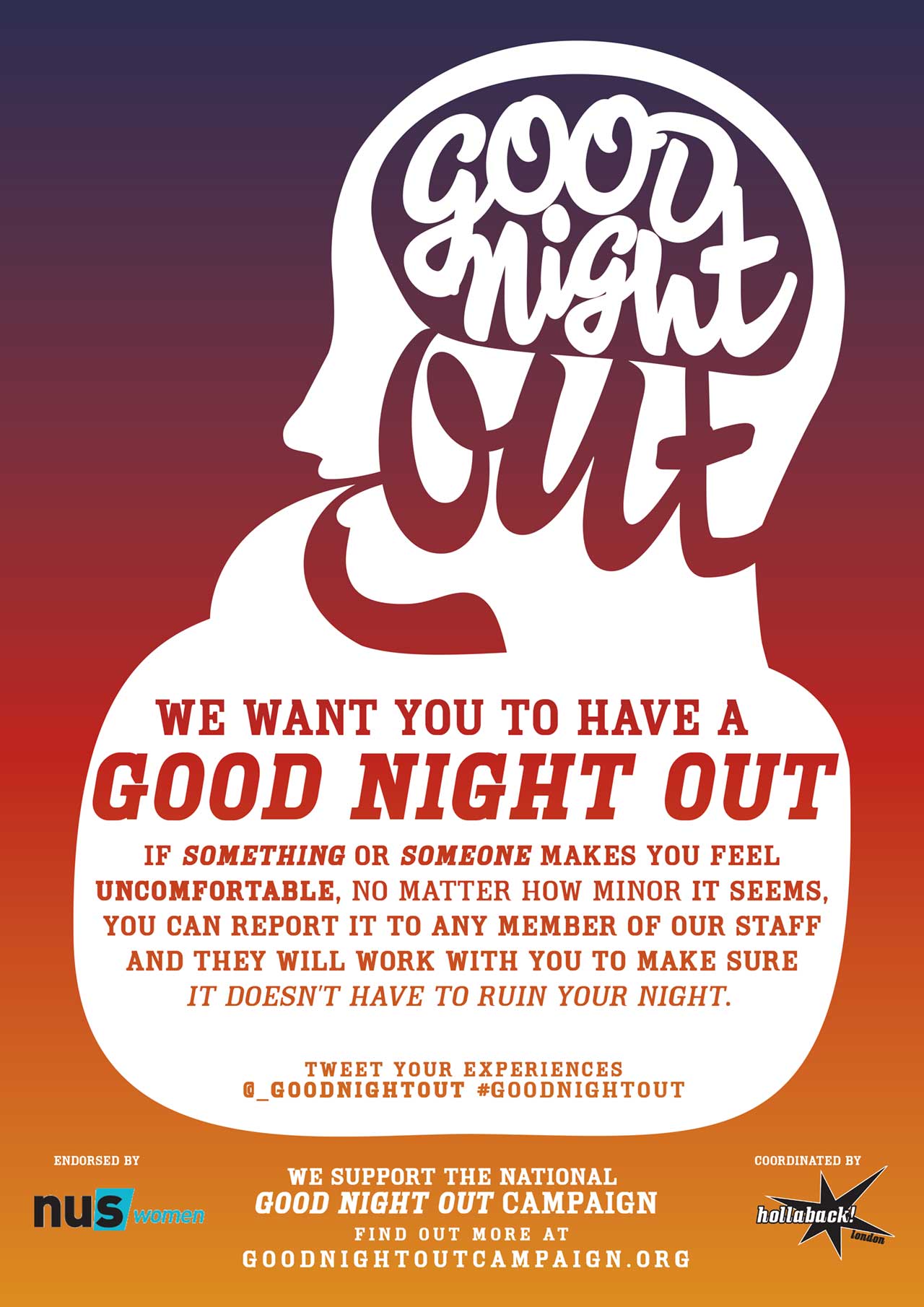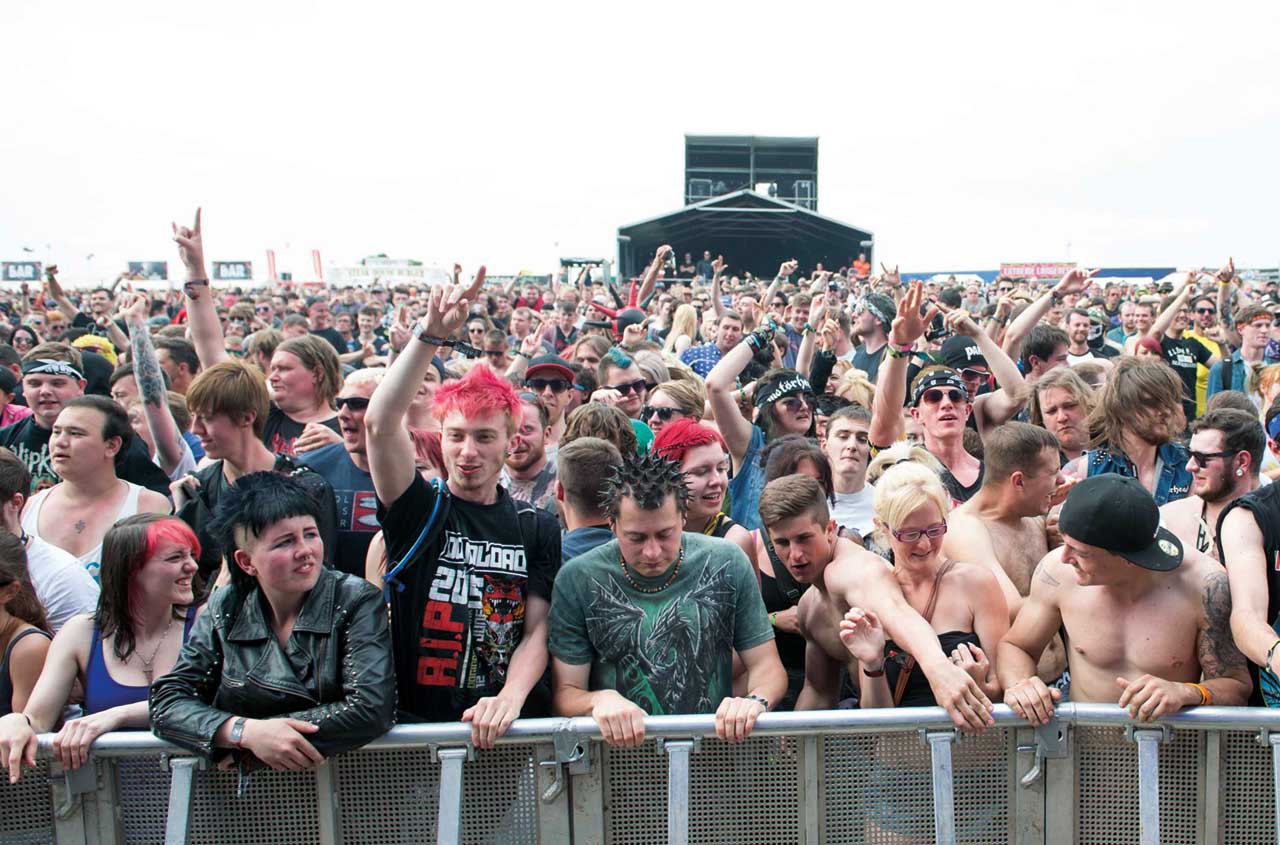Gigs are supposed to be fun. They’re a chance to spend an evening in a room full of similar people, all united in the pursuit of good music. But not all fans feel safe enough to enjoy themselves – female fans in particular face being harassed and assaulted in the crowd. Disappointingly, there are still people who pass off these incidents as nothing more than a by-product of attending shows, but fans and bands are fighting back increasingly loudly.
Rosie Solomon, a 20-year-old student, shone a spotlight on the issue recently when she decided to write about her experience of being assaulted during a Baroness gig at Birmingham Institute. It was the first time she’d been to a gig alone. “It started about halfway into Baroness’s set. I felt something pressing into my leg and bottom,” she wrote on Redbrick, the University of Birmingham’s student newspaper website. “I looked around and I saw that he had plenty of space, and was deliberately thrusting his groin into my leg from behind.” She described how she moved away, only for the man to follow her, and that it wasn’t until she “yelled at him” that he left her alone. After the gig, she reported the incident to bar staff, who comforted her while they waited for the police to arrive. Baroness responded with a statement on Facebook, stressing that they “have no tolerance for sexism, or any form of intolerant or insensitive behaviour… We are extremely sensitive to the gender disparity that can exist within the world of rock and metal, and we are embarrassed and disturbed that Rosie (or anyone, for that matter) could have had such a terrible experience at one of our shows.” They went on to address the harasser directly, writing: “Whoever you are, if you read this post, stay the fuck away from Baroness and our audience. We don’t need you at our show.”

Baroness’s tour schedule meant they couldn’t chat with Hammer about the situation, but we did speak to Rosie, who’s rightly proud of herself for speaking out. “When the man began assaulting me, I was shocked and angry. Surely in this day and age I can go to a metal gig and expect to be safe?” she says. “I decided to write the article because there were so many cases where something similar or worse had happened to one of my friends and they hadn’t reported it for fear it wouldn’t be taken seriously. I wanted to prove them wrong. I also find it quite therapeutic to write about things that upset me, so I was to some extent doing it for myself, but it was mostly to encourage others to report future instances of sexual assault.”
While her friends were “really supportive”, some of the comments under her article show that, depressingly, not everyone sees the incident she described as a problem. “[She should] get over herself, move on and get back to writing reviews because this stuff happens all the time and the world has bigger problems,” wrote one, while another suggested that the assault was nothing more than a minor incident that Rosie should have brushed off: “Ending the night broken and crying and then posting a rant on the internet doesn’t seem the most constructive reaction to a misadventure that didn’t have any lasting consequence.” Thankfully, those comments were in the minority. “Thank you for speaking out – this is something that must change,” read a comment from the music blog Echoes And Dust. A number of other commenters – male and female – called Rosie “brave” and “amazing” for writing the piece. Others challenged the trolls, asking, “What is your point? That we should ignore shit like this? That people should be allowed to grope others at a concert… because it’s ‘harmless fun’? We need to set a precedent that this shit isn’t OK.” Rosie’s determined not to let the incident put her off gigs for good, though. “I would go to a gig alone again,” she says. “If I didn’t, it would be like he’d won.”
Baroness aren’t the first band to publicly condemn predatory behaviour. Last year, Slaves (UK) made a similar statement on their Facebook after hearing about a fan being groped, and in 2014, Staind’s Aaron Lewis halted a concert to tell a group of men to leave a woman alone. It’s heartening to see that bands take the safety of their fans seriously, but it’s a shame that the danger even exists. Anecdotal evidence suggests that women are frequently on the receiving end of unwanted groping – we asked some fans to share their own experiences, and they were grim. “I get groped at gigs a lot,” wrote Jen*. “Someone even forced their hand in my pants while I was crowdsurfing once.”
I wanted to encourage people to report assault
Another felt that not enough was being done. “It’s not a subject that’s discussed enough,” she said. “It just isn’t acceptable.” Some men also shared experiences of being groped. “I was in the dance tent at a small festival, having a lovely time,” said Pete*. “Then I felt these hands on my waist. I assumed it was one of my mates but then they leaned in and kissed my neck. I turned round and it was a guy with his top off and crazy eyes so I told him to fuck off, and he did. But I had to really think about that to remember it, so I guess it doesn’t happen as often as it does to women.”
A lack of official figures makes it difficult to see the full extent of the issue. “General statistics suggest over half a million adults are sexually assaulted in England and Wales every year,” says Katie Russell, a national spokesperson for Rape Crisis. “In terms of how often this happens at gigs, it’s difficult to estimate. The vast majority of those kinds of assaults go unreported – some people don’t tell anyone at all, let alone the police.” The data that does exist suggests 90% of sexual crimes are committed by someone known to the victim – usually partners, ex-partners, friends, colleagues or family members – but incidents at gigs happen in a different setting, where the party atmosphere of a gig coupled with outdated perceptions of women means perpetrators might not even consider what they’re doing a crime. “It seems more opportunistic,” says Katie. “It is usually men [carrying out the attacks] – they are very gendered in that respect. They might expect to get away with it, or think the victim won’t mind – as ludicrous as that sounds – because of the wider culture of sexism and objectification we live in. Some of that is reflected back through pop culture, like music. I think people are desensitised to those kinds of assaults.” Women’s experiences are also dismissed because of misconceptions about what sexual assault really is. “There’s a stereo- type of a ‘good’ victim, who’s entirely blameless – going about their business in daylight without consuming any drugs or alcohol, when they’re assaulted or raped by a stranger in a public place with some physical violence involved, and the use of a weapon. That is, for many people, a straightforward case of rape,” says Katie. “Shockingly, many people have trouble understanding that the majority of sexual offences take place outside of those parameters.”

There are people tackling the issue head-on. Good Night Out is an independent, volunteer-run organisation that provides training and information to bar staff, venue managers and security staff on how to deal with sexual harassment. They partnered with nightclub Fabric in 2013 to devise an anti-harassment policy, and now have more than 150 UK venues and student unions on board. They also work with regional Rape Crisis centres and Kingston and Southwark borough councils, who help deliver the training in their local areas. “We give staff practical advice and stress how important it is to believe somebody if they report being harassed,” says Good Night Out’s co-founder, Bryony Beynon. “The fundamental reason people don’t come forward is because they’re scared of not being believed or being told that what’s happening to them is just par for the course on a night out. It’s about challenging perceptions.” She explains that venues can often be wary of involving the police in case it reflects badly on them as an organisation, but that both sides are beginning to realise that action needs to be taken. “If the police are called more than a certain number of times to a particular venue, their licence will be reviewed,” she explains. “Calling the police frequently could mean the venue is good at spotting harassment, but it’s a catch-22. Police are often reluctant to investigate this stuff because the doors are not open to them in venues. But it’s getting better; venues and police can see we’re helping them by creating an environment where this kind of stuff can’t go unchallenged.”

Bryony is a trained prevention officer with a sexual assault support centre, but even those without her expertise can make a difference. Girls Against is a grassroots campaign run by group of 16- and 17-year-olds armed with nothing more than a passionate desire for gigs to be a safe place. They’ve already attracted attention from the BBC and a number of national newspapers, as well as some of their favourite bands. “Our friend Hannah was sexually assaulted at a Peace gig, which is a band we all love,” says Anna Cowan, one of the founding members. “We were all extremely angry and concerned that there was no campaign or discussion about protecting victims, so we took it into our own hands. We didn’t plan it, it just blew up!” The fact that Anna and her friends didn’t feel supported or protected by the existing campaigns, like Good Night Out, suggests there’s still work to be done. Girls Action have been impressively proactive in the since months since they formed, even partnering with a security company called Securigroup in Scotland, where four of the five girls live, to tailor its harassment prevention course. “We’ve had Peace, Circa Waves, Kate Nash and various indie artists get in contact, and we want to expand into other genres so every fan can be safe,” Anna continues. The girls have also recruited members in other cities around the UK, via their website. “Girls Against reps will be going to gigs, talking to venue staff about training, contacting bands and distributing posters and leaflets,” Anna explains. “We’ve already had 250 applications. We also want to work with Victim Support and Rape Crisis, and sign up global ambassadors.”
What’s clear from talking to Anna is that the campaigns in place already aren’t reaching all corners of the UK. Apart from independent groups like Good Night Out and Girls Against, campaigns tend to be police initiatives. A spokesperson from The National Police Chiefs Council explained to Hammer that local police forces decide what measures, if any, are included in their budget, which explains why campaigns – and their success rates – vary across the country. The good news is that some local forces are working hard to ensure fans are safe. Donington Park, where Download Festival takes place, falls under the jurisdiction of Leicestershire Police, who send officers to the festival each year. “We do a lot of crime prevention work before and during the festival, particularly on social media,” says a spokesperson. “We have uniformed and plainclothes officers patrolling the site day and night, and we patrol jointly with the security staff. Traditionally, we don’t have a problem with Download – we only had two assaults reported last year.”

Still, that’s two assaults too many – the campaigning voices might be getting louder, but they’re happening independently of each other; a stronger partnership is needed between campaigners, venues, police and security companies, to devise a nationwide prevention strategy. “Some organisations have contacted us at Rape Crisis to get training for their staff, and we would be very interested in working with more companies to provide this,” says Katie. “Venues should also ensure their door staff have an understanding of what sexual violence is, and what they can do if someone reports inappropriate behaviour.”
The Security Industry Authority, an independent body that regulates the private security industry and reports to the government, does provide training on how to keep vulnerable people safe and spot potential predators, but, besides suggestions of calling over a friend or phoning the police, there’s no advice in the door supervisor’s handbook of how to treat the victim of an assault.
Bands and fans are coming forward in droves to condemn sexual harassment, which is undoubtedly a positive thing. There’s still work to be done to change attitudes and find a strategy that works at every gig, but the rock and metal scene is living up to its reputation as a community by sending a clear message that mistreatment of others isn’t acceptable. An assault shouldn’t have to be the catalyst that makes the scene speak out against sexual violence, but until it stops happening, we all need to keep shouting.
*Names have been changed
Getting Help
If you’ve been assaulted at a show or know someone who has, these organisations can offer support and advice
RAPE CRISIS ENGLAND & WALES
If you’ve been assaulted, Rape Crisis can offer practical and emotional support. They’re not exclusively for women, either – they recognise men can also be victims of assault and will help anyone who needs advice. They won’t make you contact the police if you don’t want to.
VICTIM SUPPORT
Like Rape Crisis, Victim Support provides practical and emotional support. They’ll assist victims of all kinds of crimes, not just sexual ones, although they do have specialist information for people who’ve been assaulted.
THE SURVIVOR’S TRUST
If you want to find a counselling or support service local to you, The Survivor’s Trust has a directory of member organisations on its website.
HOLLABACK
Founded in 2010 by Bryony Beynon and Julia Grey of Good Night Out, Hollaback is a global campaign to end street harassment. You can share your story on the website and read about the experiences of others.
